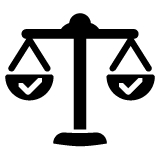Challenges
Public administration reform (PAR) has been on the agenda of international cooperation from its beginnings. While the focus has varied over time, the major reform challenge remains: how to support states and their administrations in delivering better services for their citizens.
In many countries the public administration has to fulfill other functions than meeting the above mentioned key task. Hence, reform efforts need a deep understanding of the political economy they are embedded in and should lead to systemic and political changes in the administration. Reforms from within may be complemented by measures to mobilise constituencies exerting pressure from the outside. Reform agencies, parliaments, local governments or civil society as well as compliance with international agreements may wield such pressure.
GFA concept and services
 © tong2530 | stock.adobe.com
GFA understands PAR as improving procedures, processes, structures and management skills in order to enhance the integrity, efficiency, effectiveness, and legitimacy of state action. PAR aims at enabling partner countries to improve service delivery, and makes it more efficient and geared towards citizens’ needs. This will result in better access of vulnerable groups to such services and in meeting the criteria of public integrity, legitimacy and the rule of law.
© tong2530 | stock.adobe.com
GFA understands PAR as improving procedures, processes, structures and management skills in order to enhance the integrity, efficiency, effectiveness, and legitimacy of state action. PAR aims at enabling partner countries to improve service delivery, and makes it more efficient and geared towards citizens’ needs. This will result in better access of vulnerable groups to such services and in meeting the criteria of public integrity, legitimacy and the rule of law.
GFA offers assistance in three major categories of PAR support measures, i.e. institutional framework and structure, human resource management, and organisation and procedures.
A variety of donors have trusted GFA in assessing and developing the capacities of actors at the national level, e.g. central government entities and key ministries, state agencies such as public service agencies or public administration reform units, independent oversight institutions such as supreme audit agencies or ombudsmen, or public administration schools. The GFA teams of experts also have been commended for the implementation of reform efforts at sub-national levels, e.g. regarding capacity development of municipal administrations, service delivery or human resource development.
A variety of donors have contracted GFA for assessing and developing the capacities of actors at the national level, e.g. center of government entities and key ministries, state agencies such as public service agencies or public administration reform units, independent oversight institutions such as supreme audit agencies or ombudsmen. Our teams of experts have also been entrusted with the implementation of reform efforts at sub-national levels, e.g. capacity development of municipal administrations on result-based management, service delivery procedures or human resource management.
Contact
 Harald Landauer
Harald Landauer
Senior Consultant
Governance Department
E-mail: harald.landauer[at]gfa-group.de







